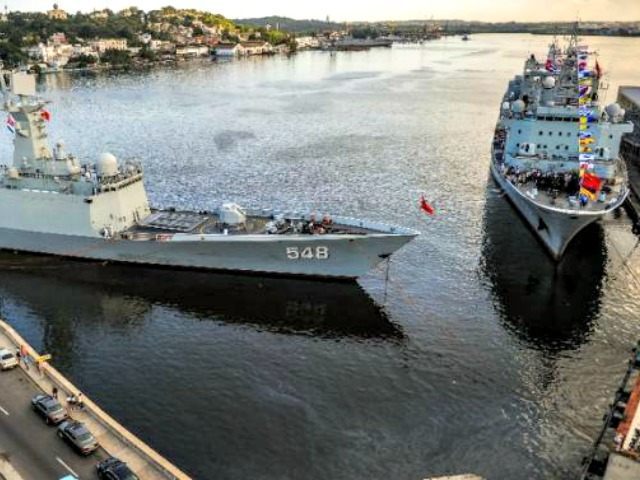The Chinese Navy docked in Cuba Tuesday night for a five-day trip celebrating the 55th anniversary of diplomatic relations between the two countries. The three-ship fleet is the first of its kind to visit Cuba, and arrives from Florida, where Chinese and American vessels conducted joint military exercises.
Despite close ties with Cuba — China is its second-largest trading partner after Venezuela — the Chinese Navy had never visited the island, or the east coast of the United States. Both nations heralded the visit as a natural activity for allies to undertake. The visit, said fleet commander Wang Jianxun, is “a chance to strengthen ties between the navies and armed forces of both countries,” as the two nations “share ideals and a shared independent development path aimed at building socialism.”
The Agence France-Presse notes that the trip out of Florida to Cuba had not been advertised in either nation’s state media prior to it occurring. State propaganda outlets for both nations applauded their militaries and welcomed China’s presence in the Atlantic.
Granma, the Cuban communist state newspaper, quoted Wang as saying that the meeting was a signal to the world that “together, we will play a more active role in the defense of global peace.” He also described the two nations as “brothers, friends, and partners.” This echoes columnists in Chinese state media outlets arguing that the visit to the United States, in particular, was “indicative of China’s establishment of a world-class navy that can patrol international waters on international missions and contribute to the global commons and international law.”
Xinhua, the Chinese state news outlet, in turn, ran quotes by Cuban Navy deputy chief Capt. Idalberto Moreno: “We are honored to receive for the first time at Havana harbor the visit of a group of combat ships from the sister navy of the China’s People Liberation Army a visit that consolidates the close ties between our peoples.” Xinhua describes Cuba as China’s “closest ally in the region” politically.
Xinhua notes that the fleet will eventually return to China, but not before making similar stops in Mexico and, once sailing through the Panama Canal, Hawaii.
It remains unclear whether the Chinese Navy will conduct similar exercises with Cuba as it did with the American Navy in Jacksonville, Florida last week, as Cuba’s navy is a much smaller operation. Chinese media reported that the Jacksonville exercises included “coordination of maritime communications, fleet operations and rescue missions.”
Chinese sailors were greeted in the Florida city by traditional dragons and, according to local media, would be docking to “visit St. Augustine as well as Disney World, shopping at the St. Johns Town Center and playing the U.S. Navy on Thursday in basketball, soccer and tug-of-war games.” On his Jacksonville stop, Wang commended the joint exercises as a way of “promoting trust between two countries and building new relations between two militaries.”
In addition to this activity in the Atlantic, a Chinese Navy hospital ship docked in San Diego, California last week, giving tours to the public and receiving a diplomatic welcome.
For many international observers, these visits arrive at an odd time in American-Chinese maritime relations. The United States Department of Defense has adamantly rejected China’s claims to the entirety of the South China Sea, sending a warship, the USS Lassen, to navigate within 12 nautical miles of the Spratly Islands, a contested territory, in late October. Last week, Defense Secretary Ashton Carter personally sailed on an American warship through the South China Sea with his Malaysian counterpart, Hishammuddin Hussein, telling reporters, “There’s a lot of concern about Chinese behavior out here.”
The Chinese have vocally opposed any American presence in the region, and monitored American maritime activity there. The South China Sea is disputed between China and Malaysia, Brunei, Taiwan, the Philippines, and Vietnam. China has refused to participate in arbitration on this matter by the International Criminal Court, though the ICC has begun hearing the case, anyway.

COMMENTS
Please let us know if you're having issues with commenting.